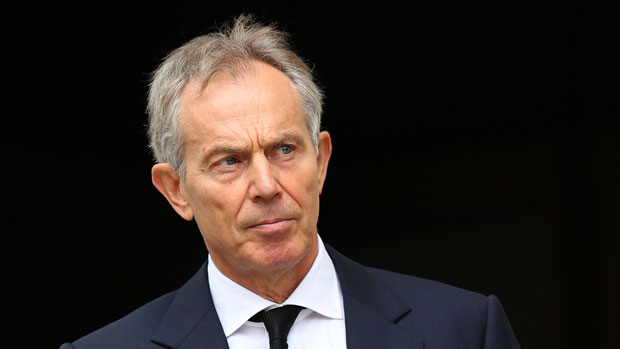Mayhem in Iraq: don’t expect Blair & Co to take blame for Isis
Murderous militants have exploited West’s botched foreign policy. But will anyone accept responsibility?

A free daily email with the biggest news stories of the day – and the best features from TheWeek.com
You are now subscribed
Your newsletter sign-up was successful
Bring back Saddam Hussein – all is forgiven. Mosul, Iraq’s third-largest city (their equivalent of Birmingham), is now controlled by a murderous al-Qaeda affiliated armed force, the Islamic State of Iraq and Syria (Isis).
Up to two divisions of the US-trained security forces of the Iraqi Government are reported to have abandoned their weapons and bugged out on Monday night rather than mount any resistance. As a result, the fourth largest arms depot in Iraq is now in Isis hands along with maybe half a billion dollars worth of cash. Even Tikrit, Saddam’s birthplace and once a stronghold of the secular Baath Party, is now in Isis territory.
Unlike so many other insurgent movements in recent history, Isis’s claims to be a state are neither bravado nor hyperbole, but simple truth. Its writ now runs from the suburbs of the Syrian city of Aleppo, 60 miles from the Mediterranean coast, east to Fallujah in central Iraq.
The Week
Escape your echo chamber. Get the facts behind the news, plus analysis from multiple perspectives.

Sign up for The Week's Free Newsletters
From our morning news briefing to a weekly Good News Newsletter, get the best of The Week delivered directly to your inbox.
From our morning news briefing to a weekly Good News Newsletter, get the best of The Week delivered directly to your inbox.
In addition to being a military force it runs its own Sharia courts and schools. Every area, institution, neighbourhood and building it controls is adorned with the black flag of holy war. Naturally, Isis is the first choice outfit of the bulk of the thousands of foreign volunteers, many from Europe and the United States, who have flocked into the area in the hope of waging jihad.
Isis’s gestation has been difficult and complex, suffering numerous setbacks in the early days, more recently gaining strength through lavish financial backing, much of which is said to originate from Qatar – money doesn’t just buy you the right to host the World Cup.
But it is now a principal beneficiary of the twin disasters visited on the region by US/UK foreign policy - the power vacuum created in the Sunni parts of Iraq by the botched eight-year-long Western military occupation; and the anti-Assad lawlessness and violence in large parts of Syria encouraged by Western leaders (and vehemently opposed by President Putin). Ironically, in the wake of news of mass beheadings in Mosul, President Assad has offered Syrian military aid to Iraq against what he calls “a common enemy”.
Certainly, the brutal martyrdom of Iraq and its people continues.
A free daily email with the biggest news stories of the day – and the best features from TheWeek.com
Meanwhile, back in London the British state’s modest and good-mannered attempts to get to the bottom of our own military and political contributions to the continuing disaster of Iraq have hit the buffers. The cause for the delay is well-known: Tony Blair is reluctant to release some of the records of his meetings with George W Bush in the run-up to the Iraq War and has been backed by the ultimate guardian of the nation’s secrets, the Cabinet Secretary Sir Jeremy Heywood; who was, as it happens, Principal Private Secretary to Tony Blair during the relevant meetings with President Bush.
Apparently, Sir John Chilcot and Prime Minister Cameron have now accepted a compromise whereby only the gists of what records were kept of those fateful meetings (Heywood wasn’t too good at taking minutes) will be published in Chilcot’s report rather than the precise language.
That a supposedly independent inquiry should accept such a shoddy compromise will hardly come as a surprise to the British public – we have got wearily used to the establishment circling the wagons in this way.
But two things are surprising and striking about the Chilcot Inquiry. First, its terms of reference – it does not seek to judge or apportion blame but merely to “learn lessons”. And second, the way some of the principal culprits/witnesses have sought to explain their behaviour. Time and again we have heard the phrase “based on the information I had at the time” used as a get-out-of-jail-free card.
In other words, both in the way the inquiry was set up and in the way many individual witnesses have told their story, the ghastly, still-unfolding disaster was not central to the event. What mattered was the motivation of individuals - not the outcomes of their actions.
It is a paradox that as politicians have become more “professionalised” they seem to approach their most onerous responsibilities in an almost amateur spirit. It’s the taking part honourably with good intentions that is important - not the result, even if it involves mayhem, ethnic cleansing and death on a massive scale.
Sir Jeremy Heywood may be more slippery than most but it has always been difficult to hold politicians and civil servants to account – they after all run the system and are adept at manipulating it.
But “fire and forget decision-making” is a new and disturbingly decadent development in our national life. It is more corrosive even than buck-passing, much on display during the Iraq hearings. At least buck-passing accepts the idea of fault – someone else’s of course but fault nevertheless.
Most of us have to live with the consequences of our decisions as do our families; and are guided, sometimes forced by circumstances to acknowledge our mistakes. If you find this age-old pattern of real life existence too austere and uncomfortable for your taste – become a professional politician.